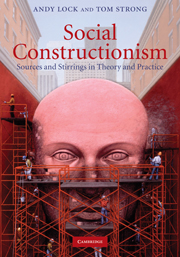Book contents
- Frontmatter
- Contents
- Preface
- Acknowledgements
- 1 Introduction
- 2 Giambattista Vico
- 3 Phenomenology
- 4 Hermeneutics
- 5 Marxism and language
- 6 Lev Vygotsky
- 7 Meanings and perspectives
- 8 Ludwig Wittgenstein
- 9 Gregory Bateson
- 10 Sociologies – Micro and Macro
- 11 Sources of the self
- 12 Michel Foucault and his challenges
- 13 Discourse analysis
- 14 Ken and Mary Gergen
- 15 Rom Harré
- 16 John Shotter
- 17 Concluding remarks
- Bibliography
- Index
15 - Rom Harré
Published online by Cambridge University Press: 05 June 2012
- Frontmatter
- Contents
- Preface
- Acknowledgements
- 1 Introduction
- 2 Giambattista Vico
- 3 Phenomenology
- 4 Hermeneutics
- 5 Marxism and language
- 6 Lev Vygotsky
- 7 Meanings and perspectives
- 8 Ludwig Wittgenstein
- 9 Gregory Bateson
- 10 Sociologies – Micro and Macro
- 11 Sources of the self
- 12 Michel Foucault and his challenges
- 13 Discourse analysis
- 14 Ken and Mary Gergen
- 15 Rom Harré
- 16 John Shotter
- 17 Concluding remarks
- Bibliography
- Index
Summary
Despite the fact that questionnaires and check-lists and so on are called ‘instruments’, and the answers that are given to them are called ‘data’, and the results of analyzing these discourses are called ‘measurements’, they are nothing of the sort, if these words mean what they mean in physics. If they do not mean what they mean in physics it would be well for the researchers who use them to enlighten us as to what they do mean … While these psychologists think they are doing mainstream psychology and conforming to the scientistic paradigm, they are actually doing something different but quite respectable, namely some small scale discourse analysis. What they present as causal laws are none other than discourse conventions. They are narratologists, despite themselves.
(Harré draft of 2002: 175)A common criticism of social constructionism is that it is anti-scientific. For the Oxford philosopher of science and social psychologist Rom Harré, that concern can represent a narrow understanding of science. This has particularly been the case given that much social science, particularly psychology, has tried to account for what it is to be human without acknowledging the central human characteristics of reasoning, agency and social interaction. Harré's discursive view of being human is a powerful critique of, and antidote to, prevailing psychological perspectives.
In his classic text that put the original first generation of cognitive psychology on the map, Ulrich Neisser noted that ‘the basic reason for studying cognitive processes has become as clear as the reason for studying anything else: because they are there … Cognitive processes surely exist, so it can hardly be unscientific to study them’ (1967: 5).
- Type
- Chapter
- Information
- Social ConstructionismSources and Stirrings in Theory and Practice, pp. 308 - 323Publisher: Cambridge University PressPrint publication year: 2010
- 2
- Cited by



